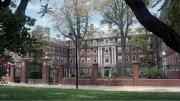With renovation of Old Quincy slated to begin next summer, Faculty of Arts and Sciences (FAS) dean Michael D. Smith and Harvard College dean Evelynn Hammonds announced today that the next pilot project for renewal of undergraduate residences will be nearby McKinlock Hall (shown above), constructed in 1925 as a freshman dormitory. After the subsequent construction of the River Houses, it became the original nucleus of Leverett House.
According to the FAS announcement, McKinlock would be closed for 15 months, beginning in June 2013, for the renovation; about 180 McKinlock students would live in swing space during the academic year, but the dining hall would remain open (with construction there scheduled during one of the summers).
The Old Quincy pilot project, the first step in exploring design, swing space, and construction options for thorough renovation of undergraduate residences, was announced in January 2011. Because it is about half the size of most of the neo-Georgian Houses, it seemed a good scale to test the challenges of the larger renovation agenda. Swing spaces to accommodate the 180 students to be relocated during the 15-month construction period were announced in April, and designs for the renovation were unveiled in May.
The Leverett McKinlock project raises new challenges. The U-shaped, neo-Georgian complex, designed by Coolidge, Shepley, Bulfinch, and Abbott, was augmented during its conversion to Leverett House in 1930 with the addition of a narrow structure along DeWolfe Street to accommodate a dining hall and master’s residence. The renovation thus involves reconstructing not only the rooms where students now reside, but also a House dining hall and master’s quarters.
Smith said in the news release, “In the Old Quincy test project, we were able to focus our efforts on the design of residential spaces, which comprise more than 75 percent of spaces within the Houses. The Leverett McKinlock test project will enable us to explore for the first time design approaches for a dining hall and a masters’ residence.” Lessons from the two pilot projects will inform the approach to the comprehensive renovation of the Houses—a multiyear project with complex financial and fundraising requirements. The statement said that “Smith again noted that timing would be tied directly to the availability of funding” (presumably secured in large part through a forthcoming University capital campaign). “As we test construction concepts, we are also testing financing models,” Smith said. “While much of the advance planning for system-wide renewal is already under way, no final decisions about moving forward can be made until funding for the project is in place.”
Leverett House master Howard Georgi, Mallinckrodt professor of physics (who has been recognized for outstanding teaching as a Harvard College Professor and serves as director of undergraduate studies for his department), has been especially active in using the House’s current common facilities both to stimulate Leverett’s community life and to accommodate weekly gatherings of physics students from throughout the College to study together and work on problem sets.









